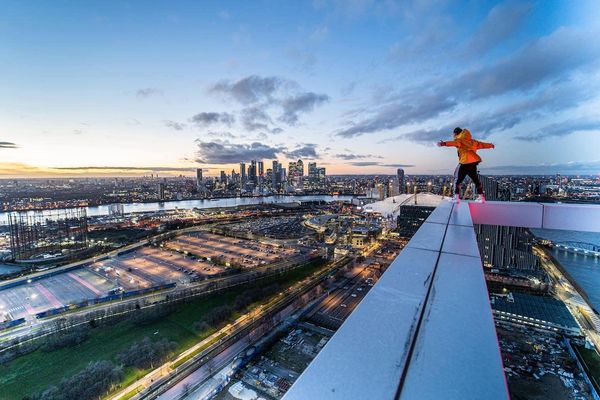Amber Wilkinson: You've been a producer for years, what persuaded you to direct?
Peter Day: I made a little film with the guys when they were parkour enthusiasts. I had moved into directing because the budgets were so small, I co directed that. But the guy who was working on it, he had to leave and we hadn't finished. All the producing work that I've done over the years, particularly when you do big TV series, you will be series producer, what they call the showrunner in US terms. So effectively, I was ending up directing films when the directors would leave. You don't get the credit for it but that's okay, it's a selfless task. I thought, I really want to direct this one because I'm going to be doing it unfunded and I had a structure in place with my company, that I could afford to do that. I got my company Faction Films to back us. I didn't take it to market for almost a year because I wanted it to be in quite a mature place. So, if anything, I had a producer's hat on but I was I was directing as well. I was thinking all the time, “How do I maximize the impact of this?” I wanted to just blow people away?
AW: How did you kind of first come to the subject matter?
PD: A friend of mine and the BBC guy wanted me to make a film about extreme urban exploration. Years before I spent an afternoon looking at these crazy stunts on the internet thinking to myself, "Wow, imagine these things that you see on small screen, being on a big screen, it's scary enough looking at it on your phone, or computer". And then I also thought, “Something you experienced privately, you then experience it publicly, with a big screen. And then I thought, “Most people just scroll through looking for the next crazy thing”. They don't invest any emotional integrity to the characters, or better yet, they don't emotionally invest in the characters. And that would make you make the simplest thing fraught with peril. And the biggest thing is even more intense. So those three things were going on in my mind. I found this one group who recently their best mate had died. And I said, “I think we should just explored the parkour group here”.
AW: Which was a great choice. How hard was it though, to persuade him to come on board because. I presume that they saw you not only as an authority figure because you were a lot older, but also as a kind of establishment figure given that you were part of the mainstream media or however you want to term that.
PD: And they they've been shafted by the mainstream media. They didn't like the BBC. And normally, when you call with the BBC, people want to be in your film. Not these guys. Effectively, they said, "We have our own audiences. We speak directly to them. And we cater our product for them. Why? Why should we trust you?"
AW: How did you sort of set about dismantling that perception?
 |
| Rikke and Aiden. Peter Day: 'With the collapse of the use of mass industrial workers, these guys are getting left behind. But they actually are very clever and super-creative' |
PD: A little bit of persistence. Clearly, I’m not the same age and I've been around the block. And I think they realised I'd been around the block. I kept meeting them without filming them. That's something I've learned over the years, that when somebody pretends they're not interested, you just come and observe them. That's what I said, I was doing. “I'm just watching what you guys do. And taking notes.” And eventually they were like, “When you're going to start filming us?”
AW: You touch on that way that social media can fuel this sort of extreme risk taking. I think that's especially because, perhaps regularly when these guys walk up the street, people either just don't see them at all, they're invisible, or they would view them as what they would call in Scotland, NEDs - non educated delinquents. Was that something that you wanted to bring out, that, in a sense, they are being encouraged to participate in evermore extreme things, because of the way that the films are working online.
PD: Yes, I would say that, I have always, in my career been interested in NEETS - not in education, employment or training. So I've always been interested in the way that academic institutions overlook people because they don't fit into that ”Goveism”. With the collapse of the use of mass industrial workers, these guys are getting left behind. But they actually are very clever and super-creative. And, as Ricky says, “There’s new ways of earning money”.
AW: You can see they see the potential of the thing, to make a living from it.
PD: Yeah, and I wanted to explore that. But coming back to this point of ‘likes’ and anonymity, I also wanted to show that when they walk down the street, they are getting bombarded with ‘likes’. If they were to turn their phone on, they would see 300 more people have liked them, or 10,000, or whatever the case was. When you and I walk down the street, I'm just walking down the street. So I wanted to show that visually, I thought, put all the all the emojis and things so they sort of swirl through, This idea that you’re moving through this.
AW: it's almost it's almost a parallel reality, isn't it? The actual reality they're walking up the but in their virtual reality, they're heroes in their own sort of game, in a sense.
PD: Yeah. I just come back to the point that it seems to me that everybody in Generation Z and earlier, even if you photograph your meal and stick it on Instagram, it has to be the perfect meal. Or you have to get the perfect holiday snap of yourself. And then there's pressure there to do. Their pressure was the same kind of impulse, but to be more entertaining.
 |
| Peter Day: 'In a sense, I'm directing them. But not to do the stunt' |
AW: Were you ever worried because, obviously, you're there with a camera that you were also, on some level, encouraging them
PD: No. As you noted, I've done a lot of films, and I've done a lot of films with what you might call naughty geezers, you might say. They’re going to do the things they're going to do whether you turn up or not. And in the case of these boys, it's pretty clear, they're really physically trained and really ready for it. They don't drink, they're not, they're not smashed when they when they do these things. In a certain way, they're professional. We didn't trespass when we filmed them, we always filmed them from a public space. We never said to them, “Would you do something on Friday?” No, they said, “We're going to do something on Friday. We'll be doing it this way”.
AW: And there was a lot of their own archive in there as well, right?
PD: A lot of us use a lot of is the what you'd call UGC – user-generated content. And because I knew they were doing it. I would say to them, “You're going to put that up in you're kind of style but could you add these shots? These are some of the shots that I need”. In that sense, I'm directing them. But not to do the stunt. For example, at the beginning of the film Ricky says, “I'm going to get on my escape vehicle”, which is a bus?. That kind of thing. You know, “Give me an ending, what you might call in the trade, an ‘up sum’.
AW: You take quite a different tack from the short, which is heavily narrated. The feature is much more freewheeling in its structure. Why did you make that choice?
PD: Because I was sick of writing, I like, don't get me wrong, I love writing voiceover. I think it's a real art, it's a skill. But also I like not writing voiceover and just letting the images talk for themselves. And what I tried to do was make the audience feel like an 18-year-old, and the confusion and the excitement and the adrenaline of it and try to make it structured. Me and the producer Grant Keir, we worked really hard on the structure, trying to follow an orthodox hero journey.
AW: I’m guessing it's not so easy to structure something when at least one of your participants has some quite serious mental health challenges that they're facing up to during the course of the shoot. Aiden, in particular, seems as though he really went through the ringer.
PD: He pulled out and here we were three-quarters of the way through a film and he didn't want to do it any more. So I don't have a film. He’s signed all the documents and everything but he didn't want to do it any more. It’s squeaky bum time when that happens is. But you know, ask any documentary filmmaker, these things happen. When you have access documentaries, the access can be pulled.
AW: So how did you get him back on board?
PD: We all held our nerve. And we showed it to him. I knew I've made, as you've noted, I've made films about naughty people. And they've watched these films, and I thought I've been critical of them. And they don't see the criticism.
 |
| Director Peter Day. 'I was thinking all the time, “How do I maximize the impact of this?” I wanted to just blow people away?' |
AW: Well, there's an element of therapy isn't there? If you're a person who has gone through your life with very few people actually asking you what you think or feel and somebody suddenly does and you see yourself in the position of answering that. That has to be quite a powerful moment, I would have thought.
PD: I really, I felt for them, you know, I feel for their plight. I was 18. And I still feel, 18 I feel the world's really difficult and confusing. I think it doesn't matter how old you get you learn less. And they know that about me. I say, “Hey, guys, I don't have any answers. You're going to feel one day you're going to feel high. And one day, you're going to feel low. And the people that flatline are not interesting”. And when you're down, you've got to realise that you might be down for a bit, then you're going come up again. It sounds kind of a bit kind of Zen about it but I was sincere about it.
AW: Do you think society is basically writes-off kids like this a lot.
PD: Yeah, of course. But these guys, as you see in the film, produce these mini thrillers, where the city is cast as their backdrop and they become like superheroes in their own Gotham City looking down on the city below. In command. In normal life – “You’re never going to own anything,” says society. I’m in awe of them. I think it’s a beautiful kind of metaphor that they get told they’ll amount of nothing and here we go, they go to the top of these buildings and command them. I’m left thinking, imagine what they could do. My quip is, imagine how good they'd be at the French irregular verbs if they just practiced like they practice parkour.
AW: What do you think society should be doing with kids like this to help them to maybe achieve more conventionally? Or do you think, they shouldn't have to do that at all?
PD: No, they should be trained. They should have it in their curriculum, YouTubing and Instagram posts and how you edit that and how you cultivate all that, that should be part of their curriculum. It's called Media Studies.
AW: In a way they’re conquering their surroundings as well as attracting an audience.
PD: That's exactly right. It's like kind of urban mountain climbers in a sub culture that is just evolving. It's post-industrial. About 20 years ago, I thought let's look at white working class tribes, which is the football hooligans, some of the more antisocial criminals, prostitutes, these kind of things, and suspend moral judgment of them and let them speak for themselves. When you when you say to people who have never been complimented in their lives, from middle class people, or institutions or authorities, I’m being bit loose, but it's remarkable, what you find if you just allow them to speak, to be open.
AW: Are you planning to direct more?
PD: I've got quite a few things that I want to do. It's about the projects to, I’ve got like four or five on the go. You have to you have to find something that you're not just passionate about, but that has a complexity to it. Like, I think I like to think that there's layers in the film, that when you watch it, you're drawn to thinking a bit more about the lives of young people and our own lives. And how you parent and how you deal with that when people when kids are going off the rails.
I've got access to an apiarist who goes to a maximum security prison here in New Zealand and teaches the inmates beekeeping. I am going to follow some young men who have come out of maximum security prison, and they're going to try and go straight using bees. These guys take inspiration from the bees.
Off The Rails will be screened as part of EIFF with screenings in Edinburgh and across Scotland from August 18. For details of these and other UK screenings please visit factionmedia.co.uk/screenings






















